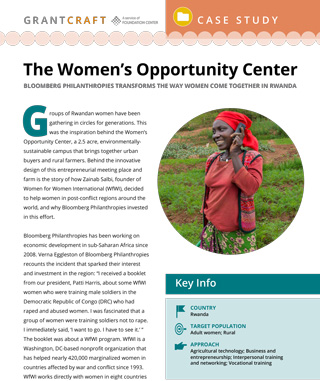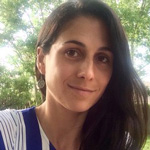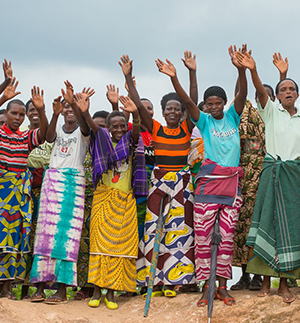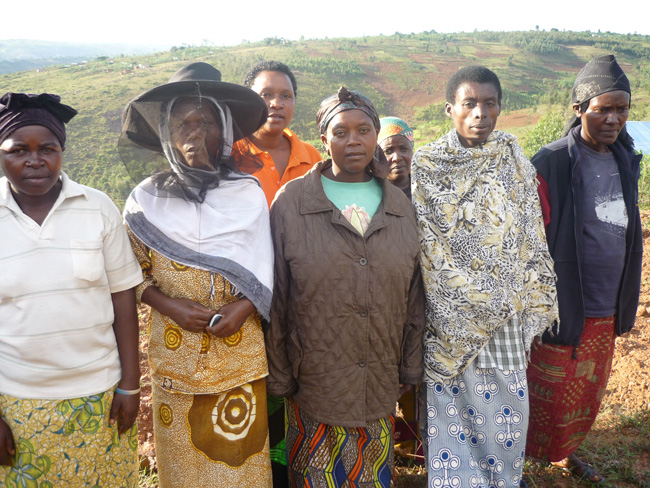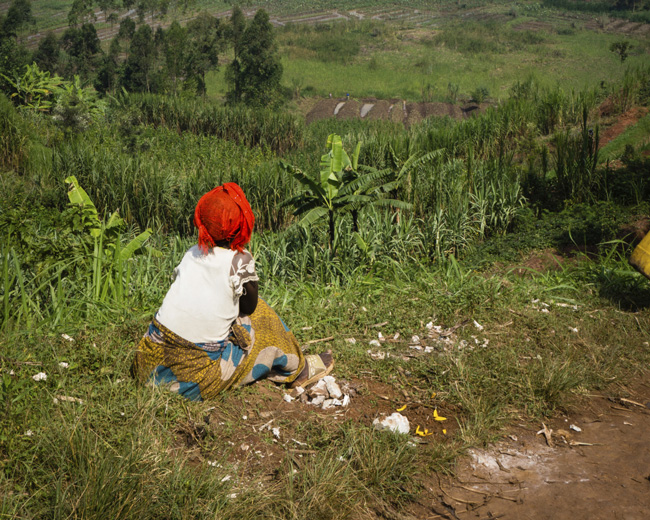The Women’s Opportunity Center Bloomberg Philanthropies Transforms the Way Women Come Together in Rwanda
Groups of Rwandan women have been gathering in circles for generations. This was the inspiration behind the Women’s Opportunity Center, a 2.5 acre, environmentally-sustainable campus that brings together urban buyers and rural farmers. Behind the innovative design of this entrepreneurial meeting place and farm is the story of how Zainab Salbi, founder of Women for Women International (WfWI), decided to help women in post-conflict regions around the world, and why Bloomberg Philanthropies invested in this effort.
Bloomberg Philanthropies has been working on economic development in sub-Saharan Africa since 2008. Verna Eggleston of Bloomberg Philanthropies recounts the incident that sparked their interest and investment in the region: “I received a booklet from our president, Patti Harris, about some WfWI women who were training male soldiers in the Democratic Republic of Congo (DRC) who had raped and abused women. I was fascinated that a group of women were training soldiers not to rape. I immediately said, ‘I want to go. I have to see it.’ ” The booklet was about a WfWI program. WfWI is a Washington, DC-based nonprofit organization that has helped nearly 420,000 marginalized women in countries affected by war and conflict since 1993. WfWI works directly with women in eight countries offering support, tools, and access to life-changing skills to move from crisis and poverty to stability and economic self-sufficiency.
To see the work of WfWI’s training first-hand, Verna traveled to the DRC and Rwanda. In DRC, Verna visited one of the largest refugee camps of more than 27,000 people. While visiting Rwanda, WfWI took Verna to witness the Gacaca courts. Also known as the grass courts, these were a transitional justice method used in Rwanda to humanely detain and prosecute people accused of genocide and related crimes against humanity. They evolved from a traditional law enforcement practice and were also designed to promote communal healing and moving on from the crisis. Members of the community were invited to join as spectators or participate as witnesses against accused perpetrators of war crimes. Verna listened to witness accounts and watched women point out the men who had killed their children and husbands.
Verna observed the effects of the Rwandan genocide on the country and its people. She visited massacre sites and drove past above-ground graves. Verna explains that everywhere they went, women were sitting in circles sharing stories. WfWI adopted this norm and brought women together over an activity, such as basket weaving, so they could socialize, tell their stories, and begin a process of healing together. “One woman who was in the Gacaca court, whose husband killed another woman’s husband, was sitting there weaving baskets with that woman.” WfWI realized that if women could come together despite shared pain, then there is something truly powerful and healing about sitting in a circle together, which is the value of the Women’s Opportunity Center (WOC). “In all my years in human development and social services, I had never experienced an organization that literally meets people where they are, without making them victims.”
Nine months after Verna’s visit to Rwanda, Bloomberg Philanthropies provided a multi-year grant to WfWI for the WOC, an education and community center. In 2013, Bloomberg Philanthropies gave another grant to WfWI for further expansion of vocational tracks and opportunities for women. To ensure sustainability of this new training initiative, Bloomberg Philanthropies engaged the Government of Rwanda early on, bringing government leadership and other representatives to the table with Michael Bloomberg, then Mayor of New York; Patricia Harris, Bloomberg Philanthropies Board Chair; Paul Kagame, President of Rwanda; and leaders from WfWI. Verna shared, “Our goal was to ensure sustainability for this investment and other projects in Rwanda, so that solutions don’t rely on philanthropy alone to continue and thrive in the long-term. Sustainability requires true partnership and dialogue with government and others, which we started early on. The Rwandan government donated the land for a farming initiative that later became the site for the WOC.”
The WOC opened in 2013. It features a series of rounded brick-walled buildings topped by steel watercatchment roofs. The 450,000 bricks used to create the structures were handmade by local women from clay dug up near the site. Sharon Davis Design, the firm that designed the space, trained a a women’s brickmaking cooperative and helped them devise a better brick-making technique, which in turn helped them to improve their income-generating skills. This training initiative was funded by Bloomberg and promised a sustainable result. Rainwater collected by the leafshaped roofs is purified by solar-powered, sand-, and UV-filtration systems, and stored for drinking and cooking. Composting toilets provide fertilizer for fields.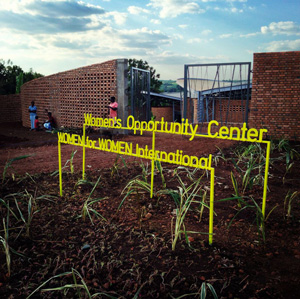
The WOC is designed to serve as a hub for the local community, especially women, to develop their businesses and other entrepreneurial activities. The facilities include a kitchen, restaurant, guest lodging, organic vegetable and fruit gardens, as well as storage, market stalls, training, and office space for lease. It also has classrooms where women learn new business skills, and where cooperatives, networks, and other groups can meet. The classrooms are shaped as circular pavilions and located at the center of the WOC, to allow women to continue to come together in a circle. Verna and the Bloomberg Philanthropies team said, “providing support by working with a partner that shares a community-informed perspective is vital to the success of this project.”
Behind the WOC, there is a large commercial demonstration farm, which was Bloomberg Philanthropies’ first investment. It is used to teach women organic farming techniques geared toward commercial production. The farm also provides food for the onsite restaurant and for sale in the marketplace. The WOC entrance is on a well-traveled road and within walking distance to Kayonza, a major transport junction between the capital, Kigali, and roads leading to the Ugandan and Tanzanian borders. In the market, women sell local products, such as food, textiles, baskets, and other products. Market stalls are also available to the public for rent.
Designed to provide economic opportunities for women, as well as educational and cultural opportunities for the community, the WOC is taking root through careful planning among the community, local government, WfWI, Bloomberg Philanthropies, and Sharon Davis Design.
The Bloomberg Philanthropies partnership with WfWI has grown and deepened. For Verna, this project has been about transformation. “Women are now in settings that allow them to become better producers, owners, job creators, and leaders in their communities.”
This case study was developed for Foundation Center's Equal Footing project.
